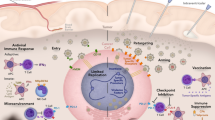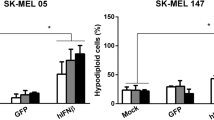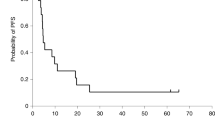Abstract
Initial studies have demonstrated the therapeutic efficacy for cancer treatment of in vivo transfer of the herpes simplex virus thymidine kinase gene followed by ganciclovir (GCV) treatment. However, recent studies have questioned the validity of this approach. Using retroviral vector-producing cells (VPC) as a source for in vivo gene transfer, we evaluated the efficacy of in vivo transduction of malignant cells using three different tumor cell models: B16 murine and IIB-MEL-LES human melanomas and a C6 rat glioblastoma. In vitro studies showed a bystander effect only in C6 cells. In vivo studies showed an inhibition of tumor growth in the two melanoma models when tumor cells were coinjected with VPC-producing retroviral vectors carrying the herpes simplex virus thymidine kinase gene, followed by GCV treatment; however, 100% of mice developed tumors in both models. Under similar experimental conditions, 70% (7 of 10) of syngeneic rats completely rejected stereotactically transferred C6 tumor cells; most of them (5 of 10) showed a prolonged survival. Treating established C6 tumors with VPC-producing retroviral vectors carrying the herpes simplex virus thymidine kinase gene and GCV led to the cure of 33% (4 of 12) of the animals. Rats that rejected tumor growth developed an antitumor immune memory, leading to a rejection of a stereotactic contralateral challenge with parental cells. The immune infiltrate, which showed the presence of T lymphocytes, macrophages, and polymorphonuclear cells at the site of the first injection and mainly T lymphocytes and macrophages at the site of tumor challenge, strengthened the importance of the immune system in achieving complete tumor rejection.
This is a preview of subscription content, access via your institution
Access options
Subscribe to this journal
Receive 12 print issues and online access
$259.00 per year
only $21.58 per issue
Buy this article
- Purchase on Springer Link
- Instant access to full article PDF
Prices may be subject to local taxes which are calculated during checkout
Similar content being viewed by others
Author information
Authors and Affiliations
Corresponding author
Rights and permissions
About this article
Cite this article
Berenstein, M., Adris, S., Ledda, F. et al. Different efficacy of in vivo herpes simplex virus thymidine kinase gene transduction and ganciclovir treatment on the inhibition of tumor growth of murine and human melanoma cells and rat glioblastoma cells. Cancer Gene Ther 6, 358–366 (1999). https://doi.org/10.1038/sj.cgt.7700056
Received:
Accepted:
Published:
Issue Date:
DOI: https://doi.org/10.1038/sj.cgt.7700056



